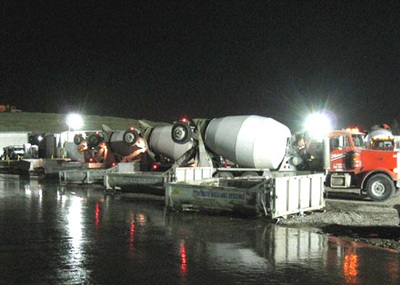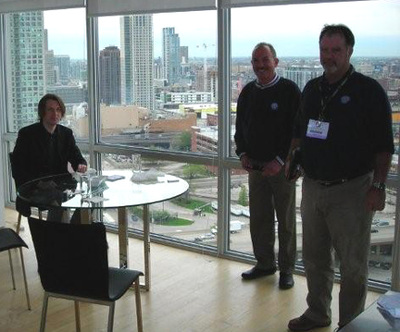CONCRETE POUR BREAKS RECORDS FOR ONE CWS OPERATOR
Congratulations to Ted Honcharik, CEO of National Concrete Washout, who just last month provided washout services for one of the most significant recent concrete construction projects in California.
The foundation for the new Kaiser Permanente medical center project in Riverside, California required 10,000 yards of concrete be poured in just 10 hours. 1,000 mixer trucks were operating on the site at one time. Ted and his team were on hand to be sure that all the concrete washout waste was managed efficiently and in full EPA compliance -- with 20 CWS bins in operation at one time.
Got an interesting tidbit you'd like to share with other CWS operators? Send it along for consideration to [email protected].
STORMWATER AD CAMPAIGN TARGETS REGULATORS
This month the readers of Stormwater magazine -- largely regulators and consultants -- will see a hard-hitting new campaign alerting them to the widespread problem of concrete wastewater mishandling. To see a copy of the ad click here:"The Construction Industry's Dirty Little Secret". (Note: this version is low resolution to make it easier to view online, and is less clear than the actual printed version.)
PATENT AND IP UPDATE
CWS has been awarded yet another patent bringing our portfolio to a total of four patents on various elements and configurations of containers for use in concrete washout. These patents are publicly available and can be viewed on the USPTO website: patent number 7118633, patent number 7121288, patent number 7124767, patent number 7364627.
MINEGAR ENVIRONMENTAL CASE SETTLED
CWS recently settled the current round of litigation with Minegar Environmental. Both CWS and Minegar Environmental are prohibited by the Court from revealing the settlement terms. However, Minegar Environmental has confirmed the validity and enforceability of the CWS patents in a consent decree.
BIG SHOW IN CHICAGO -- WASTEEXPO 08
CWS had a strong presence at WasteExpo in Chicago this year. Mark Jenkins, Joe Capko, Sascha Cocron, and the newest member of the team, John Compognis, represented CWS at the waste industry's annual gathering. Interest among waste haulers in joining the ranks of CWS operators remains strong!
MEET JOHN COMPOGNIS
Speaking of John Compognis ... John joined our team just last month as our national sales rep. Feel free to drop him a line at [email protected] and introduce yourself. (Look for a more complete profile of John in next month's Gazette.)
QUESTIONS OF THE MONTH
Q: I'm thinking of adding some containers to my inventory. Are ramped or rampless more versatile?
A: Ramped containers are much more versatile, and give you a big competitive advantage in the market. Why? Because there are many kinds of concrete transportation vehicles that require ramps to use a bin -- including most concrete pumpers and stucco/masonry equipment. By maintaining ramped containers in your fleet, you'll be able to offer your end clients much more comprehensive washout services (and much better assurance of compliance with EPA regs). And you'll make their crews happier, too!
Q: I've been wondering, what type of sump pump is best to move water between CWS Water Treatment System containers?
A: Try a ¾ horsepower sump pump -- usually less than $100 at Lowes or Home Depot.
Q: I'd like to sell some of my bins to another company. What do I need to do?
A: The answer depends on your contract. If you're a 2.0 client, selling bins to another party is usually a straightforward process; we just need to be notified to ensure that the buyer is not in a restricted territory, and understands that he is bound by the same license agreement you signed. If you are a 1.0 client with a territory minimum and other contract restrictions, whether or not you can sell your containers depends on several other factors, including whether you have met your bin minimum and other contract terms. While we do not want to restrict the transfer of bins where our licensees can benefit, to ensure fairness, we must confirm that any such transactions would not result in a licensee falling short of its agreed bin counts.
Congratulations to Ted Honcharik, CEO of National Concrete Washout, who just last month provided washout services for one of the most significant recent concrete construction projects in California.
The foundation for the new Kaiser Permanente medical center project in Riverside, California required 10,000 yards of concrete be poured in just 10 hours. 1,000 mixer trucks were operating on the site at one time. Ted and his team were on hand to be sure that all the concrete washout waste was managed efficiently and in full EPA compliance -- with 20 CWS bins in operation at one time.
Got an interesting tidbit you'd like to share with other CWS operators? Send it along for consideration to [email protected].
STORMWATER AD CAMPAIGN TARGETS REGULATORS
This month the readers of Stormwater magazine -- largely regulators and consultants -- will see a hard-hitting new campaign alerting them to the widespread problem of concrete wastewater mishandling. To see a copy of the ad click here:"The Construction Industry's Dirty Little Secret". (Note: this version is low resolution to make it easier to view online, and is less clear than the actual printed version.)
PATENT AND IP UPDATE
CWS has been awarded yet another patent bringing our portfolio to a total of four patents on various elements and configurations of containers for use in concrete washout. These patents are publicly available and can be viewed on the USPTO website: patent number 7118633, patent number 7121288, patent number 7124767, patent number 7364627.
MINEGAR ENVIRONMENTAL CASE SETTLED
CWS recently settled the current round of litigation with Minegar Environmental. Both CWS and Minegar Environmental are prohibited by the Court from revealing the settlement terms. However, Minegar Environmental has confirmed the validity and enforceability of the CWS patents in a consent decree.
BIG SHOW IN CHICAGO -- WASTEEXPO 08
CWS had a strong presence at WasteExpo in Chicago this year. Mark Jenkins, Joe Capko, Sascha Cocron, and the newest member of the team, John Compognis, represented CWS at the waste industry's annual gathering. Interest among waste haulers in joining the ranks of CWS operators remains strong!
MEET JOHN COMPOGNIS
Speaking of John Compognis ... John joined our team just last month as our national sales rep. Feel free to drop him a line at [email protected] and introduce yourself. (Look for a more complete profile of John in next month's Gazette.)
QUESTIONS OF THE MONTH
Q: I'm thinking of adding some containers to my inventory. Are ramped or rampless more versatile?
A: Ramped containers are much more versatile, and give you a big competitive advantage in the market. Why? Because there are many kinds of concrete transportation vehicles that require ramps to use a bin -- including most concrete pumpers and stucco/masonry equipment. By maintaining ramped containers in your fleet, you'll be able to offer your end clients much more comprehensive washout services (and much better assurance of compliance with EPA regs). And you'll make their crews happier, too!
Q: I've been wondering, what type of sump pump is best to move water between CWS Water Treatment System containers?
A: Try a ¾ horsepower sump pump -- usually less than $100 at Lowes or Home Depot.
Q: I'd like to sell some of my bins to another company. What do I need to do?
A: The answer depends on your contract. If you're a 2.0 client, selling bins to another party is usually a straightforward process; we just need to be notified to ensure that the buyer is not in a restricted territory, and understands that he is bound by the same license agreement you signed. If you are a 1.0 client with a territory minimum and other contract restrictions, whether or not you can sell your containers depends on several other factors, including whether you have met your bin minimum and other contract terms. While we do not want to restrict the transfer of bins where our licensees can benefit, to ensure fairness, we must confirm that any such transactions would not result in a licensee falling short of its agreed bin counts.



 RSS Feed
RSS Feed
